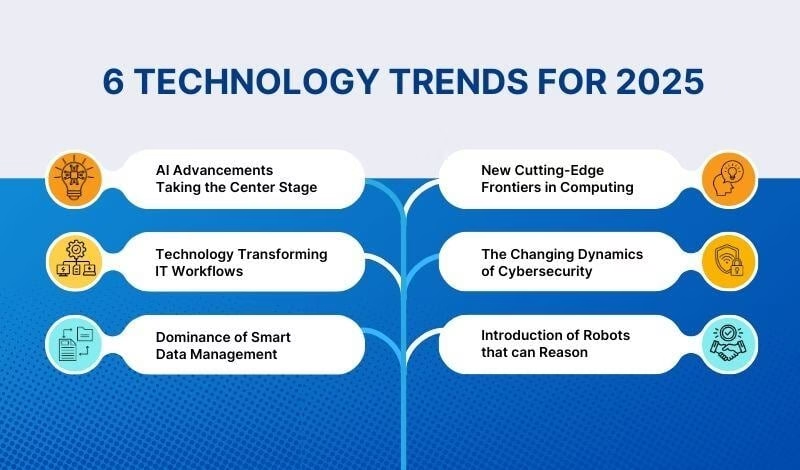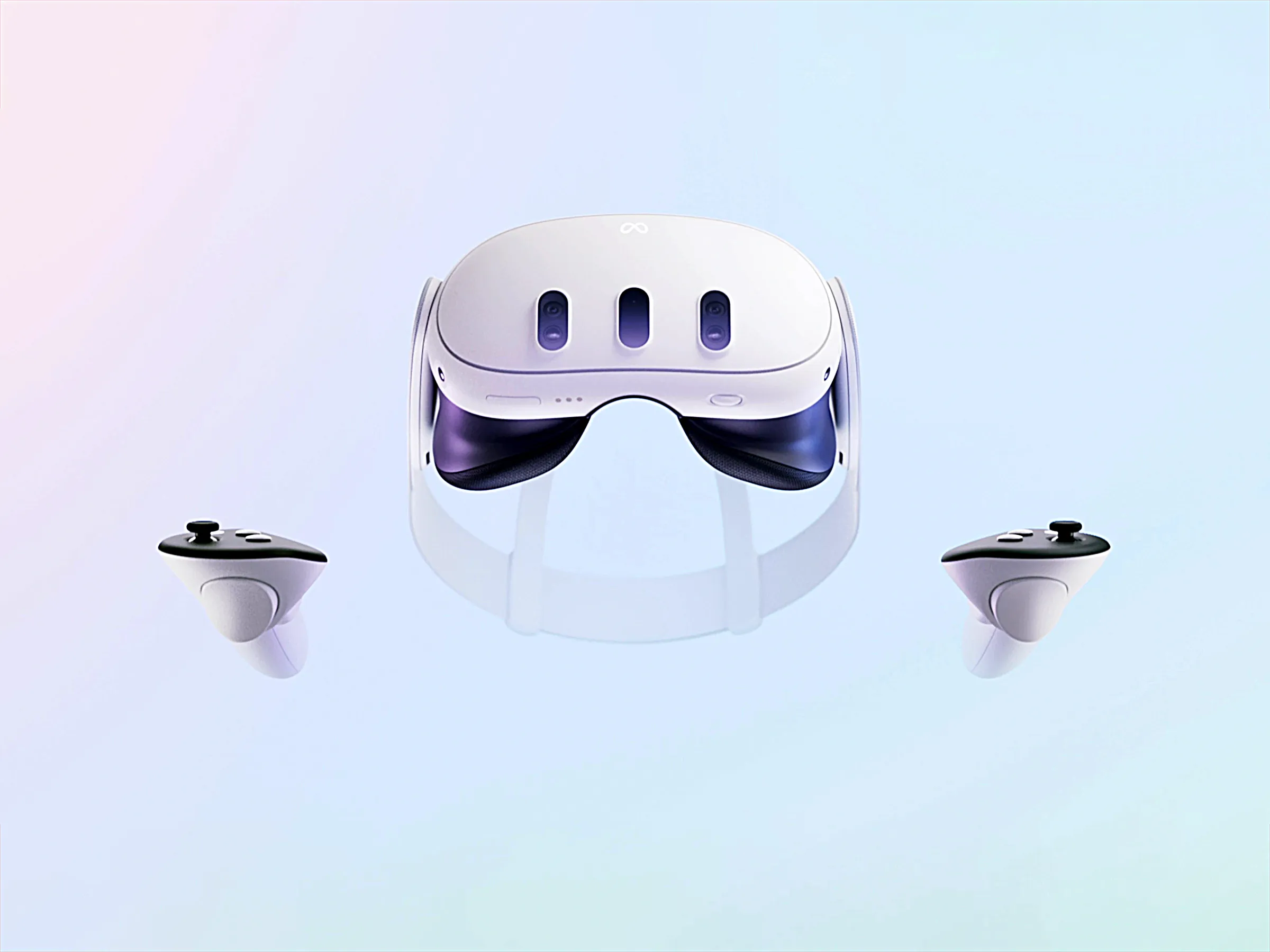Navigating the Technological Frontier: Emerging Trends for 2025
Estimated reading time: 15 minutes
Key Takeaways
- Technological progress is accelerating at a historic rate, with 2025 poised to be a pivotal year for emerging tech trends.
- Revolutionary AI advancements, especially generative AI, will significantly reshape industries and daily life.
- Other key trends include quantum computing, extended reality (XR), sustainable technology, advanced robotics, and next-generation networks (5G/6G).
- These trends are converging, creating synergistic effects that amplify their impact.
- Significant societal and economic implications include workforce transformation, evolving consumer behavior, and the need for business model innovation, alongside critical ethical considerations.
Table of contents
- Navigating the Technological Frontier: Emerging Trends for 2025
- Key Takeaways
- The Transformative Power of AI in 2025
- Exploring the Spectrum of Emerging Technology Trends for 2025
- The Synergistic Convergence of Breakthrough Technologies
- Societal and Economic Implications of Top Technology Trends
- Concluding Thoughts on the Future of Technology
- Frequently Asked Questions
The world is in the throes of relentless technological evolution, a force that is rapidly transforming our reality and setting the stage for a dynamic and exciting year ahead. As we look towards 2025, it’s clear that innovation is not just incremental; it’s exponential. At the heart of this transformation lie the emerging technology trends 2025, spearheaded by truly revolutionary AI advancements 2025. This blog post aims to provide an in-depth look at the top technology trends for 2025 and the breakthrough technologies shaping the future 2025. Research consistently indicates that technological progress is accelerating at a historic rate, with 2025 anticipated as a pivotal year for these transformative shifts. Understanding these advancements is crucial for navigating the opportunities and challenges that lie ahead. (source: simplilearn.com, mckinsey.com).

The Transformative Power of AI in 2025
The year 2025 promises to be a landmark year for revolutionary AI advancements 2025, with artificial intelligence moving beyond theoretical applications into deeply integrated, transformative roles across virtually every sector. AI is no longer just a tool; it is becoming a fundamental driver of change.
Several specific AI applications are expected to make significant impacts:
-
- Generative AI: This branch of AI is set to evolve dramatically. We can expect generative AI to create more realistic and sophisticated content, ranging from text and images to music and even code. Its ability to automate complex creative and analytical tasks will be a game-changer. Furthermore, it will enable personalization of user interactions at an unprecedented level, making experiences more engaging and tailored. (source: simplilearn.com, mckinsey.com, forrester.com).
- Discover game-changing AI-powered productivity apps.
- Explore revolutionary AI search technology.
- Generative AI: This branch of AI is set to evolve dramatically. We can expect generative AI to create more realistic and sophisticated content, ranging from text and images to music and even code. Its ability to automate complex creative and analytical tasks will be a game-changer. Furthermore, it will enable personalization of user interactions at an unprecedented level, making experiences more engaging and tailored. (source: simplilearn.com, mckinsey.com, forrester.com).
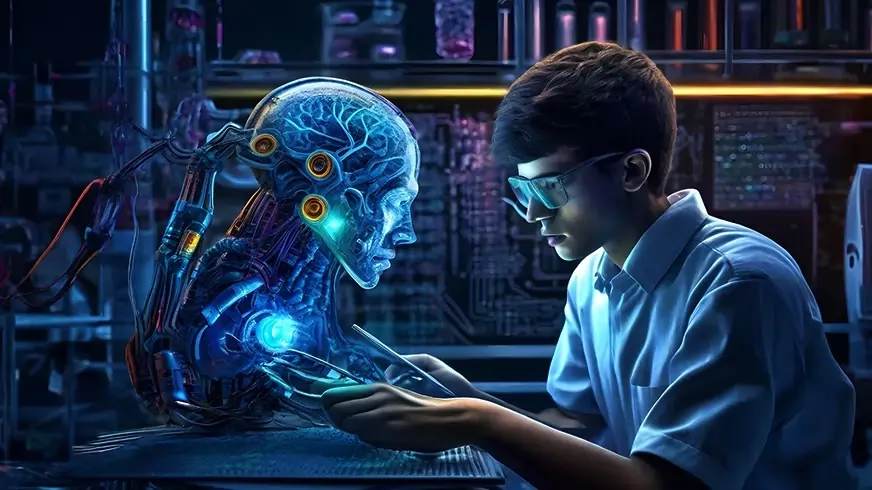
- AI in Healthcare: The role of AI in healthcare will continue to expand, particularly in advancing personalized medicine. AI will improve diagnostic accuracy and speed, allowing for earlier and more precise detection of diseases. It will also streamline drug discovery processes, accelerating the development of new treatments and therapies. (source: simplilearn.com, mckinsey.com).
- Learn about revolutionary AI medical breakthroughs in healthcare.
- Hyper-Personalization: Leveraging AI, businesses will be able to deliver highly tailored experiences across all digital touchpoints. This means more relevant product recommendations, customized content, and proactive customer support, all contributing to enhanced customer satisfaction and loyalty.
- See examples of AI-powered influencer marketing.
Crucially, AI transforming digital marketing 2025 will revolutionize strategies. AI will provide advanced tools for predicting consumer behavior with greater accuracy, optimizing marketing campaigns in real-time based on performance data, and delivering personalized content at scale. This creates new opportunities for businesses to connect with their audiences more effectively, while also presenting challenges in terms of data management and ethical implementation. (source: simplilearn.com, mckinsey.com).
- Explore game-changing AI marketing tools.
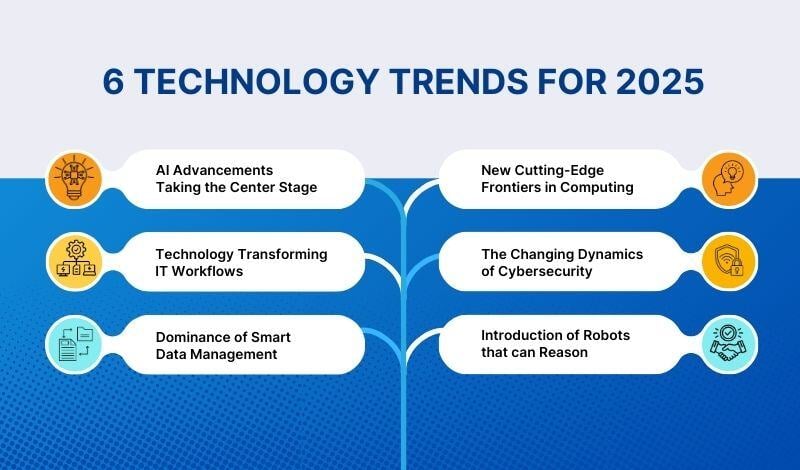
Exploring the Spectrum of Emerging Technology Trends for 2025
Beyond the pervasive influence of AI, 2025 will see a broader spectrum of emerging technology trends 2025 that are set to shape our future. Many of these trends will either complement or be significantly enhanced by AI, creating a powerful ecosystem of innovation.
Let’s delve into some of these significant trends and their potential impacts:
-
- Quantum Computing: Quantum computing represents a paradigm shift in computation. It has the potential to solve incredibly complex problems that are currently intractable for even the most powerful classical computers. This will have profound implications for fields such as cryptography, materials science, drug discovery, and financial modeling. (source: simplilearn.com, mckinsey.com).
- Discover mind-blowing quantum breakthroughs.
- Quantum Computing: Quantum computing represents a paradigm shift in computation. It has the potential to solve incredibly complex problems that are currently intractable for even the most powerful classical computers. This will have profound implications for fields such as cryptography, materials science, drug discovery, and financial modeling. (source: simplilearn.com, mckinsey.com).

-
- Extended Reality (XR – encompassing AR, VR, and MR): XR technologies are becoming increasingly integrated into daily life and professional settings. Augmented Reality (AR), Virtual Reality (VR), and Mixed Reality (MR) will offer more immersive and interactive experiences in retail, education, remote work, and entertainment, driven by advancements in hardware, user interfaces, and content creation. (source: simplilearn.com, mckinsey.com).
- Explore the Meta Quest 3.
- Discover mind-blowing VR gaming innovations.
- Get the guide to revolutionary AR-powered wearables.
- Sustainable Technology: With growing environmental concerns, innovations focused on sustainability will be paramount. This includes the development of energy-efficient data centers, the creation of sustainable materials, and advancements in green manufacturing processes and energy grids. These technologies are vital for mitigating climate change and ensuring a healthier planet. (source: weforum.org, mckinsey.com).
- Learn about sustainable computing.
- Explore AI-powered sustainability.
- Extended Reality (XR – encompassing AR, VR, and MR): XR technologies are becoming increasingly integrated into daily life and professional settings. Augmented Reality (AR), Virtual Reality (VR), and Mixed Reality (MR) will offer more immersive and interactive experiences in retail, education, remote work, and entertainment, driven by advancements in hardware, user interfaces, and content creation. (source: simplilearn.com, mckinsey.com).

- Advanced Robotics and Automation: The integration of smarter, more collaborative robots across various sectors will continue to accelerate. From manufacturing and logistics to healthcare and customer service, these robots will enhance efficiency, precision, and safety, transforming operational workflows. (source: simplilearn.com, mckinsey.com).
- Discover AI drone technology.
- 5G & 6G Networks: These advanced connectivity solutions will serve as the essential backbone for many emerging technologies. They enable real-time data processing for the Internet of Things (IoT) devices, smart cities, and autonomous systems, unlocking new possibilities for efficiency and connectivity. (source: simplilearn.com).
- Learn about 5G connectivity.
- See 5G-powered smart cities.
These trends represent the evolving landscape of innovation, contributing to the overall vision of the top technology trends for 2025 and the breakthrough technologies shaping the future 2025.

The Synergistic Convergence of Breakthrough Technologies
It’s increasingly evident that the emerging technology trends 2025 are not operating in isolation. Instead, they are converging in powerful ways, creating synergistic effects that amplify their individual impacts and lead to entirely new possibilities. This convergence is fundamental to developing the truly disruptive innovations that will define our future.
Consider these concrete examples of technological convergence:
- The synergy between AI and quantum computing is immense. AI algorithms, potentially running on quantum computing infrastructure, could power the next generation of highly sophisticated XR applications. These could be used for advanced training simulations, complex design processes, or even immersive scientific research. (source: mckinsey.com).
- Explore quantum breakthroughs and AR wearables.
- Advancements in sustainable technology are crucial for the widespread adoption of power-intensive technologies like AI and XR. Building energy-efficient data centers, developing new battery technologies, and optimizing energy grids are essential for creating the infrastructure needed for these innovations to thrive responsibly. (source: weforum.org, mckinsey.com).
- Discover sustainable computing solutions.
- The combination of AI and advanced robotics is driving smarter automation in sectors like manufacturing and logistics. AI-powered robots can learn, adapt, and collaborate, leading to increased efficiency, precision, and flexibility in production lines and supply chains.
- See the impact of AI drone technology.
This synergistic approach is fundamental to developing the breakthrough technologies shaping the future 2025 across various sectors. In healthcare, the convergence of AI and biotechnology is leading to personalized treatments and advanced diagnostics. In advanced manufacturing, automation and XR are creating more efficient and safer production environments. In energy, quantum computing and advanced materials are paving the way for more effective energy management and renewable solutions. (source: weforum.org, mckinsey.com).
- Explore AI in healthcare and 5G smart cities.
Understanding these interconnections is key to grasping the full scope of the emerging technology trends 2025.
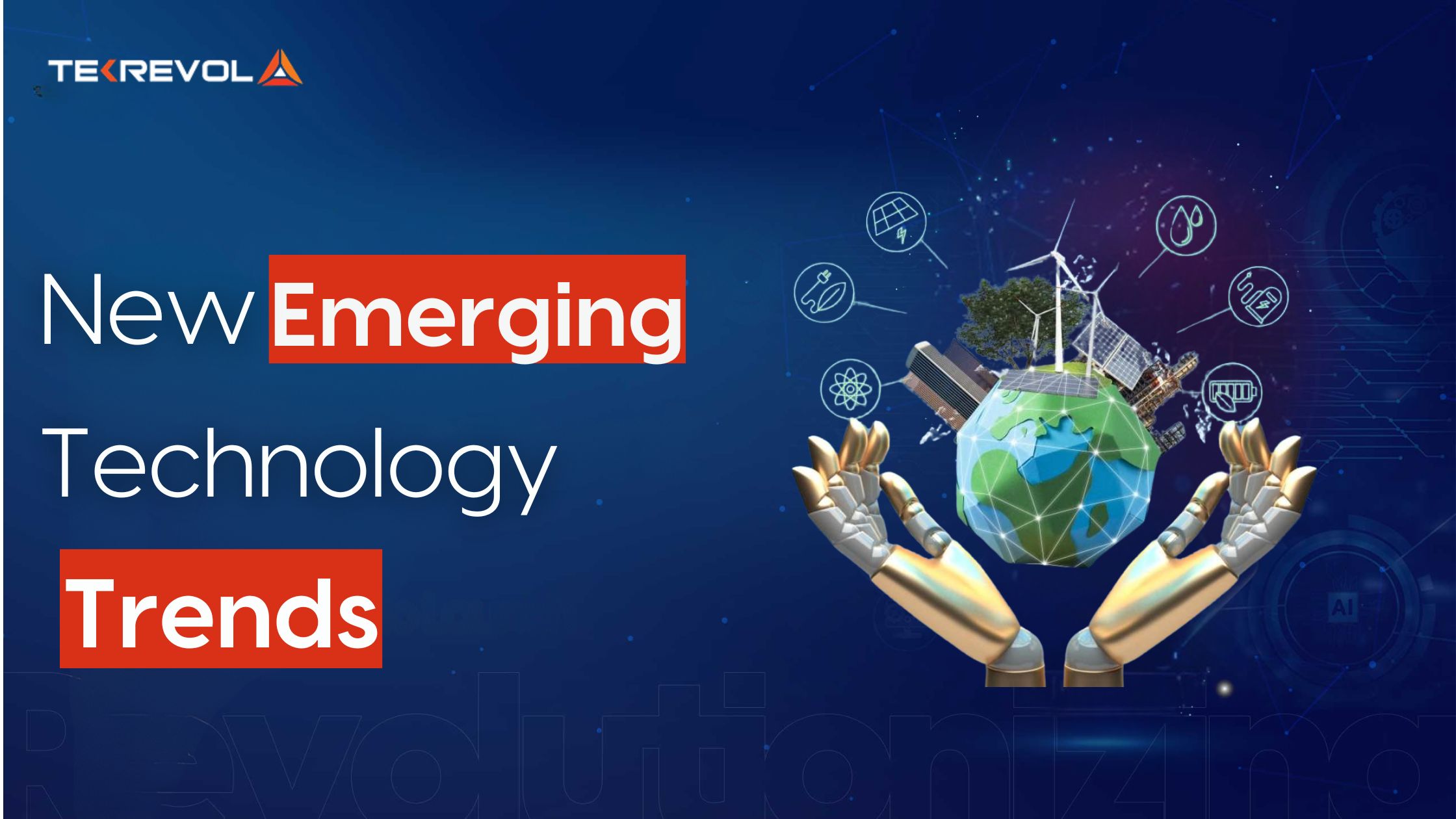
Societal and Economic Implications of Top Technology Trends
The impact of these top technology trends for 2025 extends far beyond technological advancements; they carry profound societal and economic implications that will reshape our world. Navigating these changes requires careful consideration and strategic adaptation.
Key implications include:
-
- Workforce Transformation: The demand for skills is rapidly shifting. Automation and AI are creating new job roles, such as AI trainers, data ethicists, and XR developers, while also transforming existing professions. Adaptability and continuous learning will be crucial for individuals and organizations to thrive in this evolving job market. (source: mckinsey.com, forrester.com).
- Understand the AI impact on jobs, Microsoft’s AI strategy, and AWS’s generative AI workforce.
- Workforce Transformation: The demand for skills is rapidly shifting. Automation and AI are creating new job roles, such as AI trainers, data ethicists, and XR developers, while also transforming existing professions. Adaptability and continuous learning will be crucial for individuals and organizations to thrive in this evolving job market. (source: mckinsey.com, forrester.com).

- Evolving Consumer Behavior: Increased personalization, the rise of immersive experiences through XR, and the demand for on-demand services powered by AI will fundamentally reshape consumer expectations. Businesses will need to prioritize customer-centric strategies that leverage data and technology to deliver seamless and engaging experiences. (source: mckinsey.com).
- Explore AI marketing tools and AI shopping assistants.
- Business Model Innovation: Companies must adapt their operations to remain competitive. This involves leveraging AI-driven insights for strategic decision-making, embracing new platform-based ecosystems, and rethinking traditional business models to incorporate agile, data-centric approaches. (source: mckinsey.com).
Equally critical are the ethical considerations surrounding these advancements. Issues such as data privacy, algorithmic bias, the need for transparency in AI systems, and ensuring equitable access to new technologies must be proactively addressed. Responsible innovation and careful governance are paramount to harnessing the benefits of these technologies while mitigating potential risks. (source: mckinsey.com, forrester.com).
- Understand AI ethics and bias, AI regulations, and cybersecurity.

There is a growing focus from regulators and organizations on building trust, addressing societal challenges, and promoting responsible innovation. This concerted effort is vital for ensuring that technological progress benefits society as a whole. (source: weforum.org, mckinsey.com, forrester.com).
- Read about AI regulations in the UK.
These considerations underscore the complexity and interconnectedness of the top technology trends for 2025.
Concluding Thoughts on the Future of Technology
As we look ahead, the landscape of innovation is dynamic and exciting. The key emerging technology trends 2025, with AI at the forefront, are poised to redefine industries and our daily lives. Complementing AI’s transformative power are disruptive technologies like quantum computing, extended reality, and advanced automation, each playing crucial supporting roles.
The profound impact of revolutionary AI advancements 2025, coupled with the collective force of these breakthrough technologies shaping the future 2025, cannot be overstated. It is essential for individuals, businesses, and society as a whole to embrace continuous learning, cultivate adaptability, and engage strategically with these evolving technological landscapes. (source: penbrief.com).
- Learn more about how AI is changing the world and top AI trends for 2025.

Staying informed and proactively embracing the opportunities presented by these trends will be key to thriving in the future. (source: weforum.org, mckinsey.com, forrester.com).
- Discover ways to use AI strategies.
Frequently Asked Questions
Q1: What is the most significant emerging technology trend for 2025?
A1: While many trends are impactful, revolutionary AI advancements 2025, particularly in generative AI, are widely considered the most significant, driving transformations across numerous sectors.
Q2: How will quantum computing affect current industries?
A2: Quantum computing has the potential to revolutionize industries like cryptography, pharmaceuticals, and finance by solving complex problems currently beyond the reach of classical computers. This is one of the key breakthrough technologies shaping the future 2025.
Q3: What is Extended Reality (XR)?
A3: Extended Reality (XR) is an umbrella term encompassing Augmented Reality (AR), Virtual Reality (VR), and Mixed Reality (MR). These technologies create immersive and interactive experiences that are becoming increasingly integrated into education, entertainment, and professional applications.
Q4: How is AI transforming digital marketing?
A4: AI transforming digital marketing 2025 involves using AI for predictive analytics, personalized content delivery, real-time campaign optimization, and enhanced customer engagement, leading to more effective marketing strategies.
Q5: What are the ethical considerations for emerging technologies?
A5: Key ethical considerations include data privacy, algorithmic bias, the need for transparency in AI systems, and ensuring equitable access to new technologies. Addressing these is crucial for responsible innovation.
Q6: How do these trends converge?
A6: Emerging trends converge by enhancing each other. For example, AI can power advanced XR experiences, while sustainable technology provides the infrastructure for AI and XR, creating amplified effects and enabling new functionalities. This synergy is key to the emerging technology trends 2025.
Q7: What should individuals do to prepare for these technological changes?
A7: Individuals should focus on continuous learning, developing digital literacy, and adapting to new skills required by the evolving job market. Staying curious and open to new technologies is essential.
Q8: How are businesses adapting to these trends?
A8: Businesses are adapting by integrating AI into operations, exploring XR for customer engagement and training, investing in sustainable practices, and rethinking their business models to be more agile and data-driven.
Q9: What is the role of 5G and 6G in emerging technologies?
A9: 5G and 6G networks provide the high-speed, low-latency connectivity essential for many emerging technologies, such as IoT, autonomous systems, and real-time data processing, underpinning the advancement of the top technology trends for 2025.
Q10: What are the long-term impacts of these breakthrough technologies?
A10: The long-term impacts are expected to include significant economic growth, transformation of industries, improvements in quality of life, and the need for ongoing societal and ethical adjustments to ensure technology serves humanity.
“`


